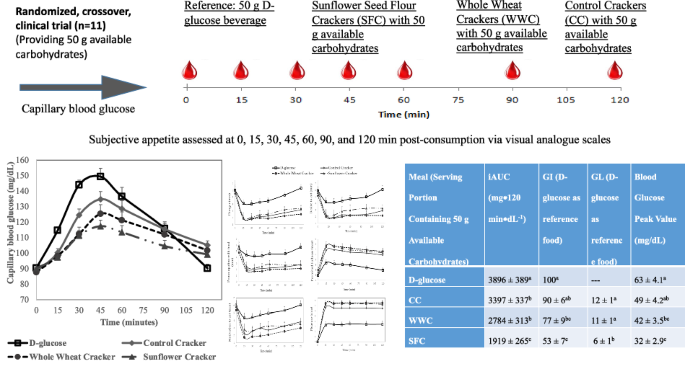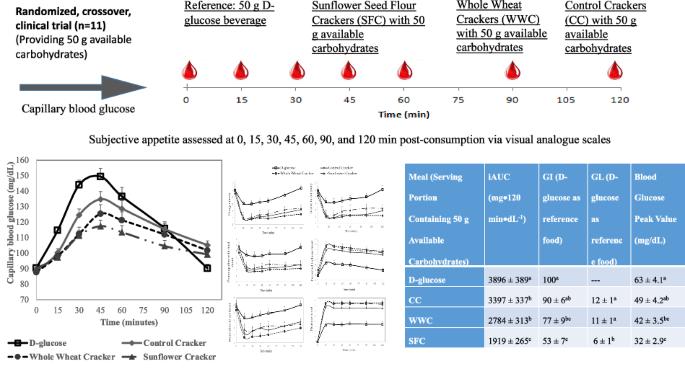The acute effects of variations in the flour composition of crackers on the glycemic index and glycemic responses in healthy adults
IF 3.6
3区 医学
Q2 NUTRITION & DIETETICS
引用次数: 0
Abstract
This study assessed the glycemic index (GI) and glycemic load (GL) of three crackers formulated with different flours: a control cracker (CC) made with conventional flour, one with 30% whole wheat flour substitution (WWC), and another with 30% sunflower seed flour substitution (SFC). This study aimed to explore the impact of these substitutions, which vary in protein and fiber content, on the glycemic responses compared to a reference glucose drink. In a randomized controlled, crossover design, 11 healthy participants (mean age 23.5 ± 1 years; 7 women; BMI 23 ± 1 kg/m2), consumed cracker meals (CC, WWC, and SFC) each providing 50 g of available carbohydrates, and a 50 g glucose reference in separate sessions. The SFC crackers provided low GI and GL values (GI: 53 on the glucose scale, GL: 6 per serving), whereas the WWC and CC crackers provided high GI (GI: 77 and 90 on the glucose scale, respectively) and medium GL values (11 and 12 per serving, respectively). Compared with the glucose reference and CC crackers, only SFC induced lower postprandial glucose concentrations, lower glucose excursions, and lower peak glucose values. All crackers were rated as enjoyable and associated with increased satiety. SFC moderated postprandial glycemic responses compared to CC and the reference (D-glucose), but not WWC. These effects may be attributed to the soluble fibers and protein content of the SFC. These findings suggest potential benefits for body weight management and glycemic control, warranting further investigation of the role of flour substitutions in healthy snack options. This trial has been registered at Clinicaltrials.gov (NCT05702372).


饼干的面粉成分变化对健康成年人血糖生成指数和血糖反应的急性影响。
背景/目的:本研究评估了用不同面粉配制的三种饼干的血糖生成指数(GI)和血糖生成负荷(GL):用传统面粉制成的对照饼干(CC)、用 30% 的全麦面粉替代制成的饼干(WWC)和用 30% 的葵花籽面粉替代制成的饼干(SFC)。本研究旨在探讨这些蛋白质和纤维含量不同的替代品与参考葡萄糖饮料相比对血糖反应的影响:在随机对照、交叉设计中,11 名健康参与者(平均年龄为 23.5 ± 1 岁;7 名女性;体重指数为 23 ± 1 kg/m2)分别在不同时段食用了各提供 50 克可用碳水化合物的饼干餐(CC、WWC 和 SFC)和 50 克葡萄糖参考饮料:SFC 饼干的 GI 和 GL 值较低(GI:53,GL:6/份),而 WWC 和 CC 饼干的 GI 和 GL 值较高(GI:分别为 77 和 90,GL:分别为 11 和 12/份)。与葡萄糖参考值和 CC 饼干相比,只有 SFC 能降低餐后血糖浓度、血糖偏移和血糖峰值。所有饼干都被评为令人愉快的饼干,并能增加饱腹感:结论:与 CC 和参照物(D-葡萄糖)相比,SFC 可调节餐后血糖反应,而 WWC 则不然。这些效果可能归因于 SFC 中的可溶性纤维和蛋白质含量。这些研究结果表明,面粉替代品对体重管理和血糖控制具有潜在的益处,值得进一步研究面粉替代品在健康零食中的作用:本试验已在 Clinicaltrials.gov 注册(NCT05702372)。
本文章由计算机程序翻译,如有差异,请以英文原文为准。
求助全文
约1分钟内获得全文
求助全文
来源期刊
CiteScore
10.60
自引率
2.10%
发文量
189
审稿时长
3-6 weeks
期刊介绍:
The European Journal of Clinical Nutrition (EJCN) is an international, peer-reviewed journal covering all aspects of human and clinical nutrition. The journal welcomes original research, reviews, case reports and brief communications based on clinical, metabolic and epidemiological studies that describe methodologies, mechanisms, associations and benefits of nutritional interventions for clinical disease and health promotion.
Topics of interest include but are not limited to:
Nutrition and Health (including climate and ecological aspects)
Metabolism & Metabolomics
Genomics and personalized strategies in nutrition
Nutrition during the early life cycle
Health issues and nutrition in the elderly
Phenotyping in clinical nutrition
Nutrition in acute and chronic diseases
The double burden of ''malnutrition'': Under-nutrition and Obesity
Prevention of Non Communicable Diseases (NCD)

 求助内容:
求助内容: 应助结果提醒方式:
应助结果提醒方式:


